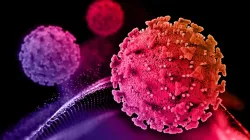HPV Awareness Day 2024: What is HPV and why is it important to be aware of it?
Understanding the link between HPV, high-risk types, and the development of warts and cancer underscores the importance of vaccination, screenings, and safe sexual practices in preventing HPV-related health complications.

Human Papillomavirus (HPV) is a group of viruses that can infect various parts of the body, primarily the genital and oral regions. It is the most common sexually transmitted infection globally.
HPV is categorized into low-risk and high-risk types based on their potential to cause health issues.
According to Dr Anusha Rao P, Consultant Obstetrics & Gynaecology, Yashoda Hospitals Hyderabad, high-risk HPV types, such as HPV 16 and 18, are associated with an increased risk of developing cancer. These viruses can integrate their genetic material into the host's DNA, disrupting normal cellular function. In the case of cervical cancer, high-risk HPV types are responsible for about 70% of cases.
HPV can cause warts, both genital and non-genital. These warts can appear on the genitalia, in the anus, and even in the throat. While genital warts are generally not associated with cancer development, they can be persistent and cause discomfort.
The mechanism by which HPV leads to cancer involves the virus interfering with the cell cycle. High-risk types can prompt infected cells to divide uncontrollably, potentially leading to the formation of precancerous lesions. If left untreated, these lesions may progress to invasive cancer.
In the context of cervical cancer, high-risk HPV infections are the primary cause. The virus infects the cervical cells, and persistent infection may result in the transformation of normal cells into precancerous ones, known as dysplasia. Over time, dysplastic cells can evolve into invasive cancer.
Preventive measures include vaccination, which is highly effective against the most common high-risk types. There are two main types of HPV vaccines: Gardasil and Cervarix. Gardasil protects against HPV types 16 and 18, which are responsible for most cervical cancers, as well as types 6 and 11, associated with genital warts. Additionally, Gardasil 9 includes protection against five other high-risk HPV types. Cervarix primarily targets HPV 16 and 18. Both vaccines are administered in a series of shots to provide robust and long-lasting protection against these high-risk HPV types. Vaccination is a crucial preventive measure to reduce the incidence of HPV-related cancers and other associated health issues.
Regular screenings, such as Pap smears and HPV tests, play a crucial role in detecting abnormalities early, allowing for timely intervention and reducing the risk of cancer development.
ALSO READ: Endometriosis Awareness Day 2024: PCOS, Obesity and other problems of infertility